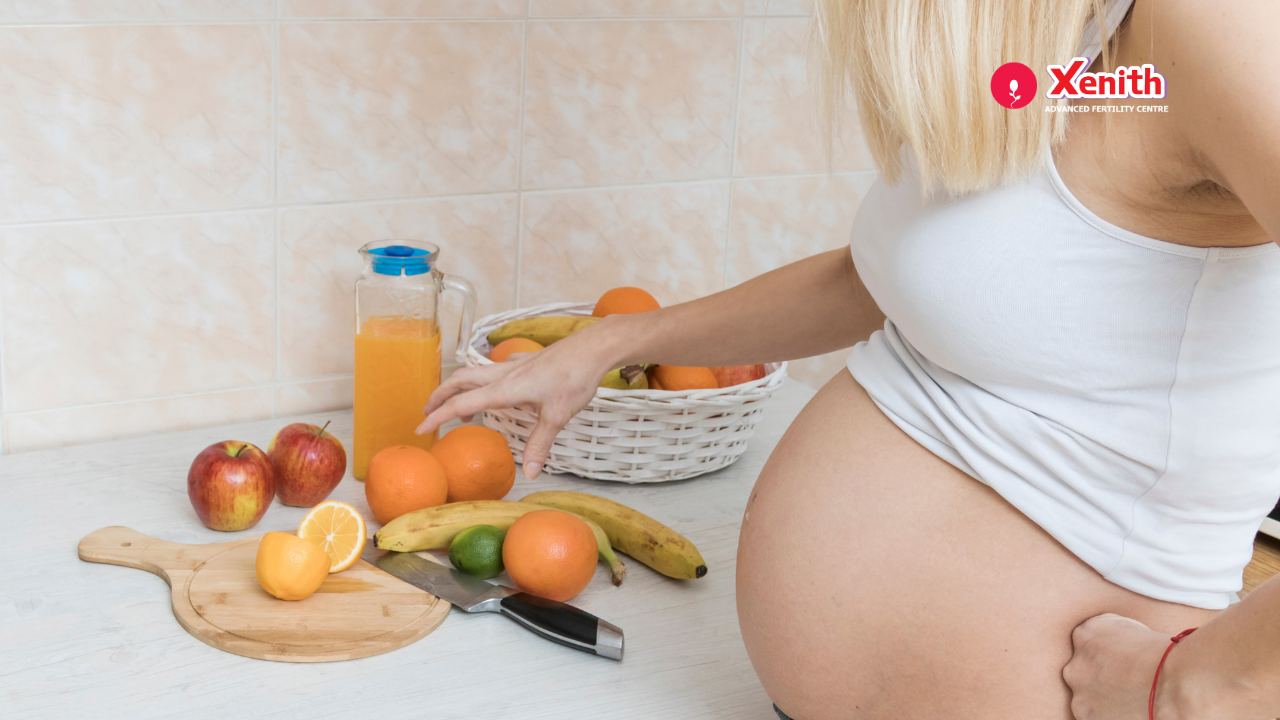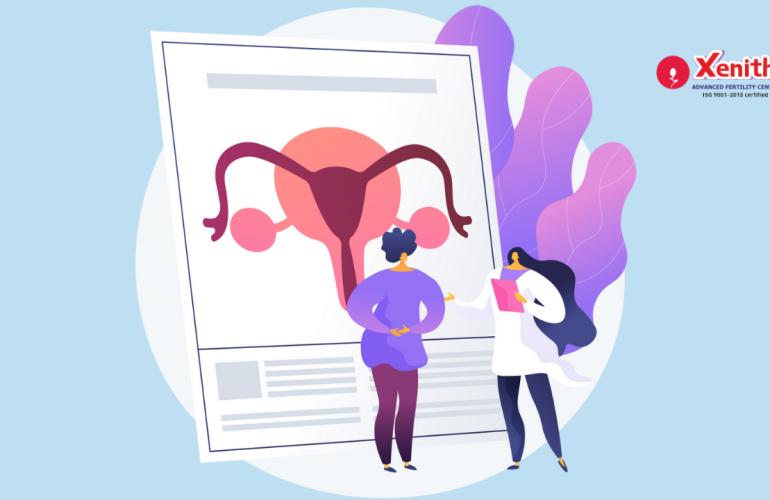Proper nutrition means eating healthy food and having a balanced diet which helps us to live and grow, protects us from illnesses, gives us energy and is even important for reproduction. A balanced diet contains all the nutrients in the proper proportion that your body needs to grow and stay healthy. There is strong evidence that proper, balanced nutrition can affect fertility in both men and women. (1) Because nutrition is important for reproduction, it is useful to form healthy eating habits to prepare your body for conception and throughout your pregnancy. Fertility can be also affected by various other factors like certain diseases and disorders, genetics, older age, ovulation issues, abnormal sperm production, lifestyle and many other things. Many of these factors like genetics are beyond our control but certain things like the way we live for example can be within our control. Lifestyle factors include diet, exercise, sleep, smoking, stress and medications among other things.
How does nutrition affect fertility
Good nutrition can affect fertility in various ways:
It can help balance hormonal levels. An imbalance of certain hormones could cause infertility. Excessive eating, fasting, or eating foods that are high in sugars or are unhealthy can affect levels of certain hormones like insulin or thyroid hormone. Since many hormones work together, they are interconnected and can throw off the balance of other hormones if one is out of sync.
Consuming foods high in unsaturated fats, whole grains, vegetables and fish are associated with improved fertility and too much saturated fats and refined sugars are linked to poorer fertility in various studies. (1)
Being obese or being underweight could affect ovarian function, cause ovulation issues, insulin resistance and lead to infertility. Obesity has been linked to taking longer time to conceive and with higher rates of miscarriage.(2)
Nutrition could also affect maturation of the eggs, quality of the egg and its efficiency of implantation. (3)
A healthy diet improves sperm quality so that you can become pregnant quicker and can reduce risk of pregnancy complications.
A balanced diet can improve the receptivity of the endometrium to the fertilized egg.
A healthy diet can also reduce inflammation, improve blood flow, decrease tissue damage so that the body can function well. (4)
What I should and shouldn’t eat to improve my fertility
In order to prepare for pregnancy, it’s important to maintain a healthy weight. It has been found that the Mediterranean diet could improve fertility. The Mediterranean diet consists of consuming lots of fruit and vegetables, pulses, whole grains, olive oil, unrefined carbohydrates, low fat dairy, oily fish, and poultry with low consumption of red meat and simple sugars. It has been associated with improving insulin resistance, metabolic disturbances and reducing obesity, which is all important for fertility. Moreover, studies show that healthy dietary patterns can also increase the chances of live birth among women using assisted reproductive technologies like in vitro fertilization (IVF) .
- Folic acid- is a B vitamin that’s very important during pregnancy. It’s needed for cell growth and repair. It can reduce the risk of the fetus developing neural tube defects. The brain and the spinal cord form from the neural tube and this develops at the very early stages of pregnancy before the woman even knows she is pregnant. It is recommended to take 400 micrograms of folic acid each day at least 3 months before conception. It is found in eggs, leafy green vegetables, broccoli, and lentils like chickpeas.
- Iron- is a mineral for helping in red blood cell production, delivering oxygen throughout the body and for optimal thyroid function. Women with less iron are said to be anaemic and have issues with ovulation, failure to implant and increase in miscarriage rates. The demand for iron increases during pregnancy and it could improve the chance of conception. Iron is found in foods like meat, fish, green leafy vegetables like spinach, legumes and beans. To improve iron intake, eat a balanced diet and try to eat Vitamin C rich foods like citrus fruits because Vitamin C helps the body to better absorb iron. Talk to your doctor before taking iron supplements because taking too high doses could be detrimental to your health.
- Omega 3 fatty acids- improve fertility by improving egg quality, reduce inflammation, regulate hormones, and improve blood flow in the uterus. It helps in growth of fetal brain. It could also improve sperm quality. It is found in certain fish, flaxseed, spinach and walnuts.
- Antioxidants support egg and sperm health and are important for fertility and conception. Coenzyme Q10 is an antioxidant which could reduce oxidative stress on tissues and improve endometrial thickness. Antioxidant-rich foods include all fruits and vegetables, nuts, seeds, legumes, dry fruits and whole grains.
- Vitamin B12- could improve sperm count and sperm quality in men. It also helps in ovulation, improves egg quality and decreases chances of miscarriage. It supports the baby’s central nervous system along with folic acid. Foods rich in vitamin B12 include fish, meat, poultry, eggs and dairy products. Because Vitamin B12 isn’t readily available in plant foods, you should speak with your doctor about getting supplements, if you don’t eat animal products.
- Low glycemic index (GI) and high fibre carbohydrates- GI is a measure of how certain foods affect your blood sugar levels. Foods high in refined sugar and carbs have a high GI, whereas foods high in protein, fiber and fats have a low GI. Foods with low GI and high fibre carbs improve fertility and affect ovulation positively. It also regulates blood sugar levels. Foods in this category include oats, whole grains, fresh fruits, vegetables like carrots, legumes like chickpeas and lentils. Try to avoid high GI foods like white bread and rice, starchy vegetables like potatoes, baked goods and juices or drinks sweetened with sugar.
- Saturated and trans fats- Reducing the amount of saturated and trans fats in your diet is important for general health because they increase the levels of bad cholesterol in your body. So try to reduce eating fried and processed foods and eating leaner meat like fish or chicken. Trans fats can negatively affect sperm morphology, and egg quality. (5)
- Avoid alcohol- some studies have shown that consuming too much alcohol could increase the time it takes you to become pregnant as well as affect ovulation, sperm production and hormone levels. (6)
Some other factors to improve fertility
Try to eat earlier as it could improve fertility. Drink lots of water and stay hydrated to improve sperm and egg health, hormone regulation, and blood supply to the endometrium. Talk to your doctor about taking prenatal vitamins.
If you have other medical issues like diabetes, endometriosis or PCOS, it would be useful to get advice from your doctor about how to improve your fertility through your diet. Nutrition can play an important role in successful conception and its important to have a balanced diet to improve your fertility and prepare your body for a healthy pregnancy. If you have any questions about the role of nutrition in your fertility, feel free to contact the experts at Xenith Advanced Fertility Centre.




